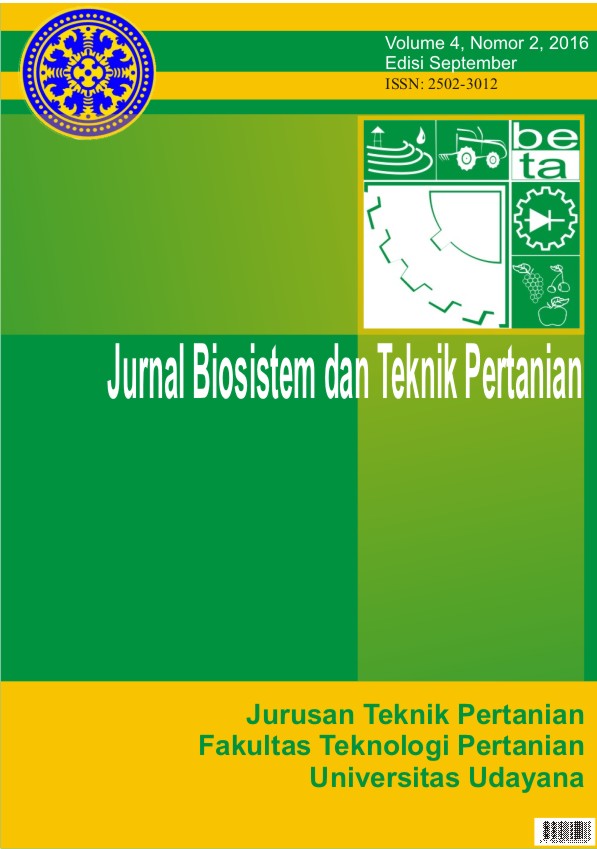Pengaruh Konsentrasi Dekstrin dan Tween 80 (Polyoxyethylene Sorbitan Monooleat) pada Proses Pengeringan Gel Daun Lidah Buaya (Aloe barbadensis Miller) dengan Cabinet Dryer.
Abstract
This study was conducted to determine the effect of the concentration of dextrin and tween 80 in the drying process by using dryer cabinet and determine the concentration of dextrin and tween 80 which can speed up the drying process of aloe vera gel. This study used a Randomized Complete Design (RBD) with 2 factors. The first factor was the concentration of dextrin (10%, 14%, 18%, 22%) and the second factor was the concentration of tween 80 (0.3%, 0.4%, 0.5%) with the drying temperature of 70°C. The experiment was repeated three times. Observations were made every 2 hours until the sample weight did not decrease. Variables which observed were rate of drying, whiteness, yield, and pH of flour aloe vera. The results showed that concentrations of dextrin and tween 80 significantly affected water content, the degree of whiteness of the flour was affected by concentrations of dextrin. Treatment interaction between dextrin concentration and tween 80 did not significantly affect all parameters observed. The addition of dextrin will slow the drying process, on the contrary the addition of tween 80 will speed up the drying process. The highest yield at amount of 10.99% was obtained from the treatment interaction of 22% dextrin with 0.3% tween 80. The degree of acidity (pH) of the flour at 4.00 which was the highest value of pH was yielded form the treatment interaction of 10% dextrin with 0.5% tween 80. In this study, the best treatment resulting aloe vera flour that approaching the standards of quality of Terry Laboratories was a treatment interaction of 22% dextrin with 0.3% tween 80. The flour had a water content of 8.68%, the degree of whiteness 50.51, yield 10.99%, and the degree of acidity (pH) 3.65.
Downloads
References
Anonimus. 2011. http:// health.kompas.com / read / 2011 / 03 / 12 / 10012780 / Lidah Buaya Bantu Atasi Diabetes. (Diakses pada tanggal 8 Desember 2013)
Fennema, O. R. 1985. Food Chemistry. Marcel Dekker, Inc. Cleveland.
Gonnissen Y, Remon JP and Vervaet C. 2008. Effect of Maltodextrin and Superdisintegrant in DirectlyCompressible Powder Mixtures Prepared Via Co-Spray Drying. European Journal of Pharmaceutics and Biopharmaceutics 68:277–282.
Latifah dan Apriliawan A. 2009. Pembuatan Tepung Lidah Buaya Dengan Berbagai Macam Metoda Pengeringan. Rekapangan:Jurnal Teknologi Pangan : 70-80.
Mulyandari, S.H. 1992. Kajian Perbandingan Sifat-Sifat Pati Umbi-Umbian danPati Biji-Bijian. Skripsi. IPB, Bogor.
Ramadhia M, Kumalaningsih S dan Santoso I. 2012. Pembuatan Tepung Lidah Buaya (Aloe vera L.) dengan Metode Foam-mat Drying. Jurnal Teknologi Pertanian : 125-137
Ratti C and Kudra T. 2006. Drying of foamed biological materials: opportunities and challenges. Journal Drying Technology 24(9): 1101–1108
Reynolds, James E.F. 1982. Martindale The Extra Pharmacopolia, Edition Twenty Eigth. The Pharmacentical Press. London.
Rowe, R, C., Sheskey, P.J., dan Weller, P.J. (2003). Handbook of Pharmaceutical Excipients. Edisi IV. London: Publisher-Science and Practice Royal Pharmaceutical Society of Great Britain. Hal. 181-185, 453-455.
Sankat C and Castaigne F. 2004. Foaming and drying behaviour of ripe bananas. LWT - Food Science and Technology 37: 517–525.
Steel, R. G. D. dan J. H. Torrie. Prisip dan Prosedur Statistika, Suatu PendekatanBiometrik. Terjemahan Bambang
Sumantri. 1993. Gramedia PustakaUtama, Jakarta.
Syahputra. 2008. Pembuatan Tepung Lidah Buaya. Fakultas Teknologi Pertanian. Universitas Sumatera Utara. Medan.
Winarti C dan Nurjanah N. 2005. Peluang tanaman rempah dan obat sebagai sumber pangan fungsional. Jurnal Litbang Pertanian 24(2):47-55.
Wirakartakusumah A, Budiwati S.I, Arpah M, Subarna, Syah D, 1992. Petunjuk Laboratorium Peralatan dan Unit Proses Industri Pangan. Departemen Pendidikan dan Kebudayaan. Dirjen Pendidikan Tinggi. Pusat Antar Universitas Pangan dan Gizi IPB, Bogor.












 Jurnal BETA (Biosistem dan Teknik Pertanian)
Jurnal BETA (Biosistem dan Teknik Pertanian)


